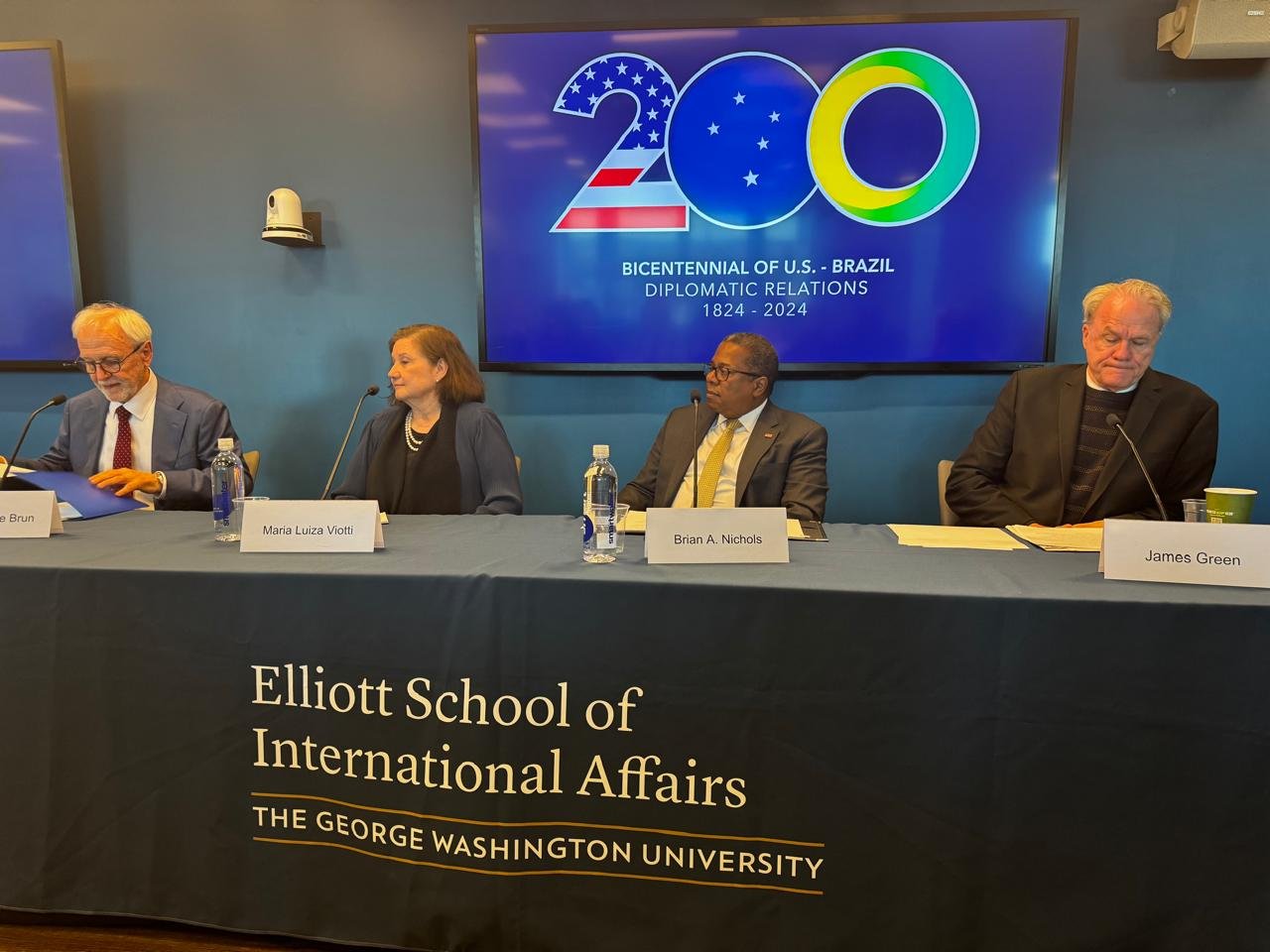U.S.-Brazilian Relations: A Complicated Affair
James N. Green is Professor of Brazilian History and Culture at Brown University and the President of the Board of Directors of the Washington Brazil Office. This article was written by Coelho especially for issue 114 of the WBO weekly newsletter, dated April 26, 2024. To subscribe to the newsletter, enter your email in the field below.
The symposium, “Strengthening Ties: A Reflection on 200 Years of U.S.-Brazil Relations”, co-organized by the Washington Brazil Office (WBO) and the Latin American and Caribbean Studies Initiative at George Washington University (GWU) and held on April 22 at the GWU Elliott School of International Affairs, offered a unique opportunity for activist-scholars, Brazil specialists, U. S. and Brazilian diplomats, and the public to discuss the interactions between the two countries over the last two centuries.
While the underlying theme of the event was a commemoration of the recognition of an independent Brazil by the government of President James Monroe in 1824, the speakers mostly focused on the last sixty years of U.S.-Brazil relations.
In this brief essay, I will share some of the main themes of my presentation.
The symposium, “Strengthening Ties: A Reflection on 200 Years of U.S.-Brazil Relations”, co-organized by the Washington Brazil Office (WBO) and the Latin American and Caribbean Studies Initiative at George Washington University (GWU) and held on April 22 at the GWU Elliott School of International Affairs
First, one must acknowledge that relations since formal recognition have been both positive and intimate, but also fraught with tensions, disillusionment, and estrangement. There have been noted convergences and periods of mutual alienation.
One moment of important cooperation was the joint effort to fight fascism in World War II. That alliance ensured that strategic minerals and other natural resources were available to defeat Germany, Italy and Japan. The United States established naval and air force bases along the coast of Brazil to supply the North African war front and block a theoretical Axis invasion of the Americas. Moreover, Brazil provided 25,000 troops to fight in the victorious Italian campaign.
The collaboration between the military of the two countries strengthen the U.S. government’s influence over the Brazilian armed forces. Ironically, and I would argue tragically, Vernon Walters, who was the U.S. Combat Liaison Officer for the Brazilian Infantry Division in Italy during the war, served as the military attaché assigned to the U.S. Embassy in Rio de Janeiro in 1962.
After arriving in Brazil, he played a crucial role in helping to coordinate and unite the conspiratorial forces that overthrew the Goulart government in 1964. U.S. support for the coup was premised on a campaign led by the military and the Right to root out corruption, communism, and immorality within the framework of the Cold War. It marks a low point in the relations between the two countries.
At the time, many US policymakers failed to comprehend the legitimate power of nationalist sentiments, as well as the importance of the mobilization and integration of the urban working classes into key sectors of the economy as Brazil rapidly industrialized.
On the other hand, the activities of the Biden administration and key members of Congress in defending the Brazilian electoral process in 2022 sent a clear and consistent message that unlike in 1964 the U.S. government would not support a coup to overturn the recent presidential elections. It could arguably be viewed as a high point in the relationship between the two nations.
In 2021, the Washington Brazil Office decided to focus on educating the U.S. public about the Brazilian presidential elections and the growing indications that the then president of Brazil, like his U.S. ally Donald Trump, was planning to challenge the outcome by questioning the electronic voting system and appealing through his supporters for the armed forces to intervene should he lose.
Among the many activities that the WBO carried out was organizing a delegation of representatives from twenty social movements and civil society organizations who traveled to Washington, D.C. to educate members of Congress and representatives from the State Department, the White House, and the Organization of American States about the dangers to democracy posed by the Brazilian president and his supporters.
The Biden administration’s messaging and the backing it received through initiatives in Congress, including a unanimous consent resolution approved by the Senate, were unequivocal in their support for Brazilian democracy.
As we now know, Brazil’s January 8, which took place two years later on January 6, 2023 with the invasion and vandalism by far-right extremists of the headquarters of the three seats of the power in Brasilia, failed to achieve the plan to overthrow the current government due in large part to divisions in the armed forces. Some military leaders were simply not willing to take the risk of supporting a coup without U.S. backing.
In this regard, the initiative of the WBO and affiliated organizations to request that the Biden administration release key classified U.S. government documents about the 1964 coup--as a goodwill gesture to Brazil and as a sign of embracing the past with openness and transparency-- could be an additional way for Washington to show its commitment to building a relation with a democratic Brazil based on mutual respect between the two largest and important countries in the Western Hemisphere.


